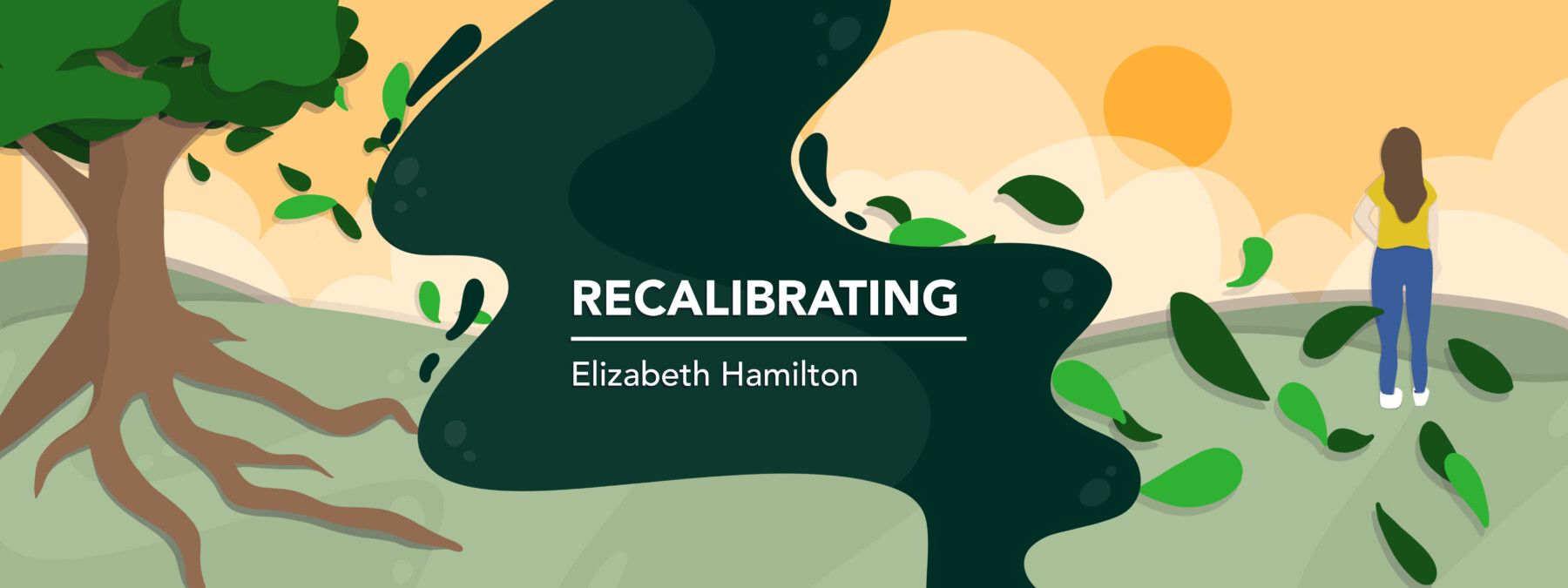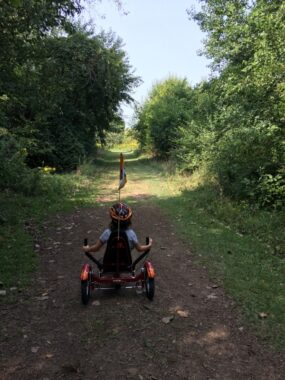A tribute to the kindness of strangers along our FA journey
When you've lost control and are overwhelmed, others are there to lift you up
Written by |

“Here, can I help with that?” The calm, low voice interrupted my ongoing battle with the payment station in the parking garage at our local children’s hospital. My dollar bills and credit cards had been rejected, and I was fishing in my purse for quarters while words were streaming out of my mouth and tears down my face. My breakdown was finally happening and it was over $2.
Anyone who has gone through a diagnostic odyssey knows firsthand how little patience there is for things not working as they should. That day, it was the ability to pay my parking ticket to leave the garage. I was at the hospital so I could drop off the imaging of my 5-year-old daughter’s eyes from an outside clinic. Amelia’s eyes had always gathered attention from onlookers because they were beautiful. Now, they were the focus of medical professionals trying to determine why her balance had taken such a turn. I love those eyes.
Could the images be transferred from one clinic to the next with signed consent? Yes, they could. Did I feel the need to micromanage that process so the neurologist had images in color? Of course, I did. If I could do one thing in this space that had blindsided me so, it was manage documentation. It’s funny what we fight to control when we feel so helpless in caring for the ones we love the most.
Receiving the message
It started small for Amelia, our second daughter. She was tripping while walking down the street, needed to hold a hand, or grew tired easily. The tripping escalated and so did the regimen of clinics, doctors, and specialists for this little girl who held my heart in her every step.
Since that time over five years ago, I have found myself in the care of many strangers who knew nothing about our journey but provided what I needed in a moment when I didn’t even know what I needed. When Amelia’s diagnosis of Friedreich’s ataxia eventually came, I found new strangers who showed up. They responded to emails in a parents group, were members of our research group at the Friedreich’s Ataxia Research Alliance, had Zoom meetings so that I could ask questions, or wrote columns for Friedreich’s Ataxia News about their experiences — the same platform from which I am reaching out to you today.
On the day I lost the battle with the parking machine, I won something as well. That calm voice belonged to the smiling face of a stranger who paid for my ticket and refused my wrinkled bills. At that moment, I began sobbing. I had done so well until that point at managing my life while suppressing my heartache. I had been running department meetings at work, providing care for our two children, cooking dinner, and running through the proverbial checklist of life as if things were normal; but they were not. My family’s “normal” was now altered, and there were things I could not fix — things outside of my power to control.
I know the stranger said something of comfort, but I don’t remember what. What I do remember was the message of his actions as he stood with me by that machine. I share this message with you today, from one stranger typing on a keyboard to another reading this column somewhere: “You are not alone.”

Amelia rides her adaptive bike. (Photo by Elizabeth Hamilton)
As I have worked to navigate my life, I have found it critical to look at things in a new way and to reset my expectations. Sometimes this requires recalibrating who I am and how I show up in each moment of each day. Recalibrating is not easy, and sometimes I swing too far or not far enough. Yet in those moments, I grow, I learn something new, and I try again. I do so because those beautiful eyes are watching me, and I want Amelia to know that together, we can do hard things.
Here’s to the journey.
Note: Friedreich’s Ataxia News is strictly a news and information website about the disease. It does not provide medical advice, diagnosis, or treatment. This content is not intended to be a substitute for professional medical advice, diagnosis, or treatment. Always seek the advice of your physician or another qualified health provider with any questions you may have regarding a medical condition. Never disregard professional medical advice or delay in seeking it because of something you have read on this website. The opinions expressed in this column are not those of Friedreich’s Ataxia News or its parent company, Bionews, and are intended to spark discussion about issues pertaining to Friedreich’s ataxia.




Kristin Brindle
So beautifully written and so true! See you in August at CHOP "stranger".
[email protected]
I loved your post, of life with friedreichsarataxianew.com…even though I don’t have this condition. I have
Periodic paralysis and belong to their support group…both genectic conditions with different genes affected.
Yet, so similar in the frustrations, embarrassment, inabilities, depression, life changing for ourselves, families and friends, etal.
Your child’s adaptive wheels, makes me wish I could have one just like Alexia’s, truly.
Can’t tell from the photo, but is it electric or does she pedal? The design with the wide handlebars, three wheels??
And rugged outdoor wheels..I want that…I am 76 years old, are they made just for children’s ages?
Diane
Elizabeth Hamilton
Thank you so much Diane! The bike is called a Mobo and YES they do have adult versions! It is a more affordable version of a trike and has been on many a grassy path for this kiddo! Thank you so much for your comments and I am glad this column connected with you. Elizabeth
Rebecca
Hi Elizabeth.
I have enjoyed reading all your articles today. I resonate with these words more than I expected. I'll take a page out of your book and write here as I think it will also be therapeutic for me as it seems to have been for you. There are moments from growing up with my mom with post-polio (a less drastic degenerative disease) where help from strangers ranged from carrying groceries to plowing our driveway to quite literally helping me save her life.
I'll replay these moments in my mind forever. Especially the one where I was pushing her wheelchair across a train platform, and a wheel got stuck just as I heard a train coming. I screamed for help, and I have never been so grateful for the aid of the two strangers who immediately ran to my assistance to lift her out of harm's way. I won't just remember the moments when I needed or called on help, though. I will remember every single gesture of kindness, no matter how small the help was. They changed my life as much as I am sure these moments also impacted theirs.
I think the impact is both ways because outside of situations with my mom, I often concoct visions of myself as a hero when I feel out of control or helpless. When I can't save myself, I think about how incredible it feels to save others. Maybe this stems from growing up around parents I didn't understand. With both physical and mental disabilities, they often left me confused or frustrated by why things happen to us that are so out of our control. My logical mind gets swollen with emotions when it doesn't understand. It inhibits me from moving forward, so I often escape to my own dream world. This has been a subconscious defense mechanism for as long as I can remember. I've always had this drive to impact others. And maybe it is because I often feel helpless to aid or change those closest to me.
I am constantly thinking about how I could improve someone else's day or help strangers I pass on the street. Wild, hypothetical scenarios run through my mind. As crazy, even, as jumping in front of the child beside me to save them from an imaginary stray bullet. But part of me questions this motivation. Is it because I genuinely want others to succeed and protect them, or do I want my own feeling of satisfaction that comes with helping?
There is no lie in the fact that it feels good to help others. To feel needed. To feel appreciated. This gives me a sense of purpose. Now that I am outside the caretaker role, I wonder how to channel this purpose into my non-dream world. Can I make these visions a less dramatic reality? I admire your ability to change the course of your career and let go of things to make room for new ones that fit better to take their place. I see myself doing this at a smaller scale within my academic journey, and it gives me peace.
Thank you for sharing your story in these articles. I know it can't be easy. I found myself tearing up simply writing this response – as it is steeped in harsh memories, heartache, and love.